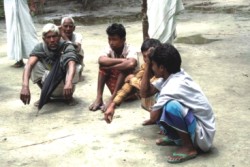|
View from the Bottom
Footsteps of Hunger Come Nearer
Shahnoor Wahid
 The lady who assists my sister in doing her household chores comes from an extremely poor family of Ulipur under Kurigram district in greater Rangpur. She has been living in that house for the last seven years and now happily calls my sister's family her own. My sister's children have become too fond of her and wouldn't let her go anywhere. Many visitors wonder at the respect and love 'bua' gets from the entire. It is only natural that bua protects their honour, life and property with all her might.
Some months back, bua's younger brother came to meet and tell her a sad story. Extreme poverty in the Kurigram and Ulipur area is forcing poor families to disintegrate, fall apart, often never to be united again. Able-bodied men from 15 to 55 are migrating to other parts of the country in search of work. As they walk towards the unknown horizon they do not look back at their women and children weeping behind. Many never come back. Some prosper in another land and marry a local girl and settle down there. The women back home are left alone and unprotected to endure hunger and famine and other social evils.
Bua's brother has two growing daughters, one little son and a sick wife at home. He has no means to provide two meals a day for them. There is no work in the area. Every morning he hears the footsteps of hunger nearer than before. It scares him. Starving to death is a horrible way to die, especially when so much of food goes to waste in other parts of the country, he contemplates.
Finally, he has taken the most painful decision of his life and asked for bua's help. That is why he came to Dhaka spending the money he saved in the last five months. He wanted bua to find safe shelters for his daughters so that his wife back home could manage to survive with the little son. He himself was on his way to Chittagong in search of work. He was not sure when he would be able to return. He was not sure whether he would return at all. Tears running down his cheeks, he said even if some good souls would want to take his two daughters for good, like adopt them, he would never want to see their faces again. It was better than seeing their dead faces. Dead from hunger.
Bua wiped her own tears. For a while she was lost in her thoughts of the long and cold nights in Ulipur where she herself fought against hunger in her younger days. Many days she ate only once a day so that her children and an ailing husband could eat well. She picked shapla from the middle of the river to cook a meal for them.
My sister asked both of them, “When there is little food in your area and when men do not find work on a regular basis, why do you have so many children? Why don't you go for family planning?” Both bua and her brother lowered their heads. After a while bua sent her brother outside and said something haltingly to my sister. It meant there was no social recognition of family planning in the area where they lived. Community leaders stopped any discussion or overt campaign and even discouraged shops to sell contraceptive materials. If a girl failed to produce many children she would be suspected of taking pills and rebuked by the elderly women of the village and they would also report it to the leaders. Women had no voice in this regard.
Bua found two shelters for her two nieces. They go to school now. The family members love them as their own family members. They will grow up and go for higher studies. They will get married one day. Will they remember the mother still fighting hunger in a remote village in Ulipur? Will they want to know the whereabouts of their father? Maybe not. In a hungry world people do not indulge in such human emotions.
Copyright
(R) thedailystar.net 2007 |
